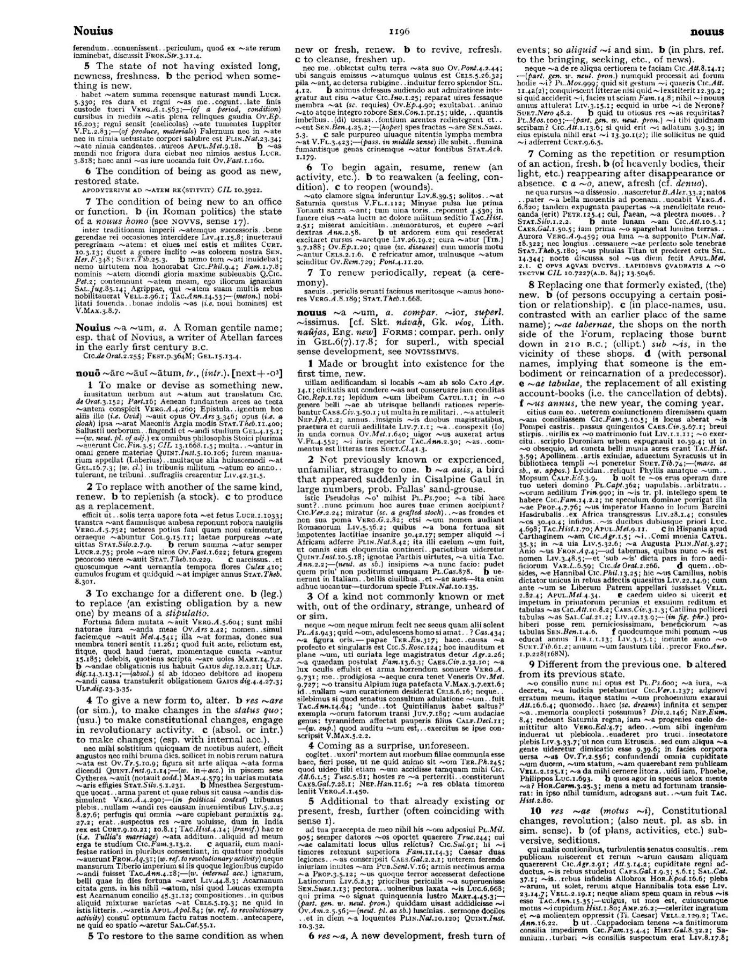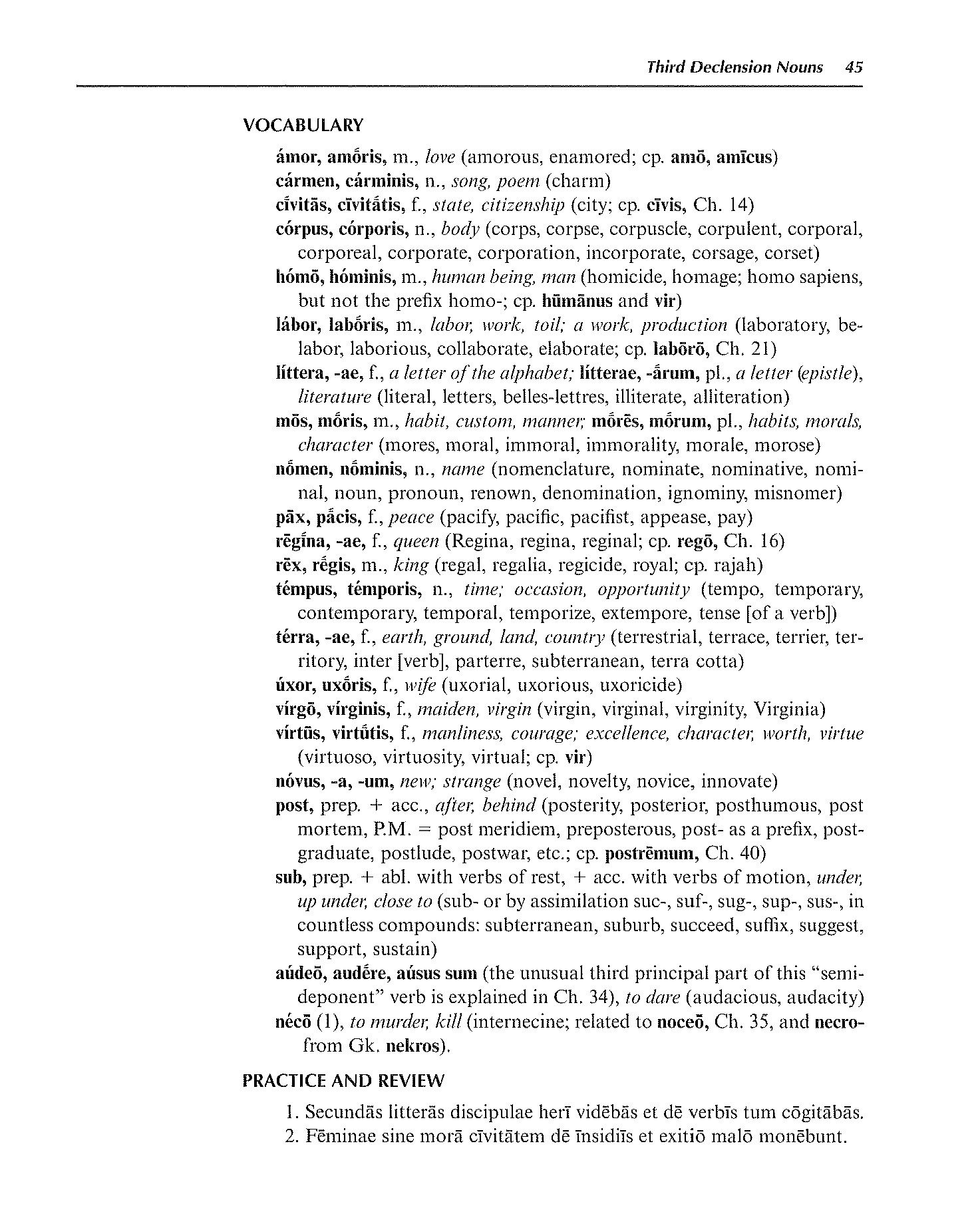
page_listing.tpl
page_subListingDetails.tpl
sub_listingDetails_style1.tpl
sub_listingDetails.title.tpl
novus new
novus is a Latin Adjective that primarily means new.
Definitions for novus
Wheelock's Latin
Adjective
- 1
new, strange
English derivatives:
novel novelty novice innovate
Oxford Latin Dictionary
Adjective
- 1
Made or brought into existence for the first time, new.
- 2
Not previously known or experienced, unfamiliar, strange to one. (b) ~a auis, a bird that appeared suddenly in Cisalpine Gaul in large numbers, prob. Pallas' sand-grouse.
- 3
Of a kind not commonly known or met with, out of the ordinary, strange, unheard of or sim.
- 4
Coming as a surprise, unforeseen.
- 5
Additional to that already existing or present, fresh, further (often coinciding with sense).
Sentences with novus
Latin to English
Ubi sunt trēs novī amicī quōs in urbe vīdistī?Compare Where are the three new friends whom you (sg.) saw in the city?
Cum sē in aliam terram contulisset, tamen amīcōs novōs invēnit.Compare Although he had gone into another country, nevertheless he found new friends.
Nova nupta super limen sublata est ne laberetur.Compare The new bride was carried over the threshold in case she stumbled.
Idus Martius adsum reus iubeo, qui dies novus magistratus ineo honor.Compare He ordered the defendant to be present on the Ides of March, on which day the new magistrates were about to enter upon their office.
Hibernaculum, res novus miles Romanus, aedifico coepi.Compare Winter tents, a novelty to the Roman soldier, were begun to be built.
Hic in caput sum quidam novus, qui ego magnopere delecto.Compare Under this head there are certain new ideas, with which I am greatly pleased.
Dictator deinde adventus novus vetus exercitus iungo et copiae duplico.Compare Then, on the arrival of the dictator, the new army is joined to the old one, and the forces are doubled.
Maiores noster novus urbs tam brevis (tempus) edifico.Compare Our ancestors built a new city in so short a time.
Data sources
Notes
- Definitions
- Frederick M. Wheelock, Wheelock's Latin, 6th ed., rev. Richard A. LaFleur (New York, NY: HarperCollins Publishers, 2005): 45.
- P. G. W. Glare, Oxford Latin Dictionary, Vols. 1-8 (Oxford: Clarendon Press, 1982): 1196.
- Word frequencies
- Christopher Francese, "Latin Core Vocabulary," Dickinson College Commentaries, last modified 2014, http://dcc.dickinson.edu.
- Paul B. Diederich, The Frequency of Latin Words and Their Endings, PhD diss., (Columbia University, 1939).
- Louis Delatte, Suzanne Govaerts, Joseph Denooz, and Etienne Evrard, Dictionnaire fréquentiel et index inverse de la langue latine [Frequency Dictionary and Inverse Index of the Latin Language] (Liège, Belgium: Laboratoire d'analyse statistique des langues anciennes de l'Université de Liège [L.A.S.L.A.], 1981): 120.
Bibliography
Allen, Joseph H. Allen and Greenough's New Latin Grammar for Schools and Colleges: Founded on Comparative Grammar. Edited by James B. Greenough, George L. Kittredge, Albert A. Howard, and Benjamin L. D'Ooge. Boston, MA: Ginn & Company, 1903.
Crystal, David. A Dictionary of Linguistics and Phonetics. 6th ed. Oxford, UK: Blackwell Publishing, 2008.
Delatte, Louis, Suzanne Govaerts, Joseph Denooz, and Etienne Evrard. Dictionnaire fréquentiel et index inverse de la langue latine [Frequency Dictionary and Inverse Index of the Latin Language]. Liège, Belgium: Laboratoire d'analyse statistique des langues anciennes de l'Université de Liège (L.A.S.L.A.), 1981.
Diederich, Paul B. The Frequency of Latin Words and Their Endings. PhD diss., Columbia University, 1939.
Francese, Christopher. "Latin Core Vocabulary." Dickinson College Commentaries. Last modified 2014. http://dcc.dickinson.edu/latin-vocabulary-list.
Gildersleeve, Basil L., and Gonzales Lodge. Gildersleeve's Latin Grammar: Third Edition, Revised, and Enlarged. 3rd ed. London, England: Macmillan and Co., 1903.
Glare, Peter G.W. Oxford Latin Dictionary. Vols. 1-8. Oxford, England: Clarendon Press, 1982.
Krüger, Bernd. "Latin Conjugation Tables." Cactus2000. Accessed May 5, 2023. https://latin.cactus2000.de/index.en.php.
Pierson, Nick. "Sound of Text." Accessed October 26, 2019. https://soundoftext.com.
Wheelock, Frederick M. Wheelock's Latin. 6th ed. Revised by Richard A. LaFleur. New York, NY: HarperCollins Publishers, 2005.
Wiktionary Contributors. "Victionarium." Wikimedia Foundation, Inc. Updated March 18, 2019. https://la.wiktionary.org/wiki/Victionarium:Pagina_prima.
Citation
Chicago (17th ed.)
Allo Contributors. "novus, nova, novum (adj.) - Latin Word Definition." Allo Latin Dictionary. Last modified . Accessed February 19, 2026. http://ancientlanguages.org/latin/dictionary/novus-nova-novum.
Entry created on . Last updated on .








